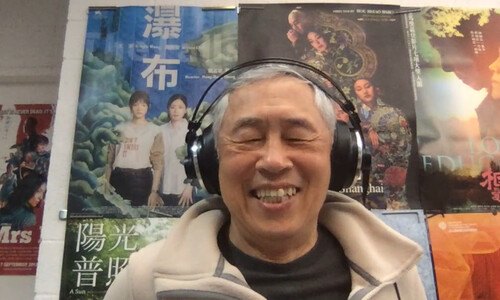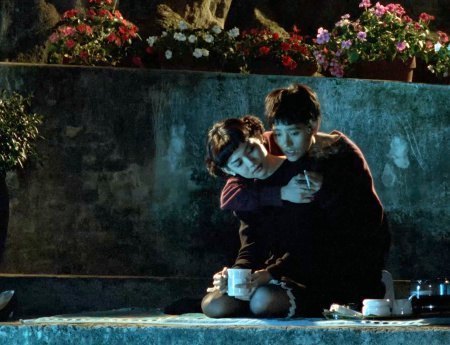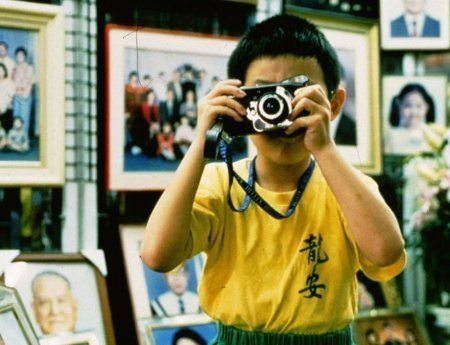Jasny dzień lata
Przygotuj sprzęt i wciśnij play by uruchomić doświadczenie
Pokazy w kinie
Kinoteka 2
Kinoteka 2
Dostępność online
Materiały dodatkowe
Opis filmu
Tajpej z początku lat 60-tych. Xiao Si zostaje przeniesiony do szkoły wieczorowej z powodu niskich wyników w nauce. Czwarty syn w rodzinie inteligenckiej, nieśmiały chłopak, pozostaje na uboczu wojen młodzieżowych gangów, rozgrywających się na ulicach Tajpej. Pewnego dnia poznaje Xiao Ming – dziewczynę lidera jednej z grup, który ukrywa się gdzieś na południu wyspy. Xiao Si coraz bardziej angażuje się uczuciowo w tę znajomość, lecz nie jest w stanie zmienić ani charakteru Xiao Ming, ani rzeczywistości, w której żyją.
Inspiracją dla scenariusza Jasnego dnia lata była sprawa Mao Wu – ucznia elitarnego liceum Jianguo w Tajpej, który z zazdrości zabił swoją dziewczynę. Incydent miał miejsce w 1961 roku, wtedy gdy Yang był uczniem tego samego liceum. Intencją reżysera była szczegółowa rekonstrukcja rzeczywistości Tajpej lat 60-tych poprzez staranny dobór rekwizytów, kostiumów i lokacji, a także charakterystyczny dla epoki styl wizualny. Przestrzeń filmowa przyjmuje formę korytarza, tworząc tunele wizyjne i pogłębiając zanurzenie w świat przedstawiony. Czterogodzinny seans tego filmu to prawdziwa podróż w czasie i przestrzeni.
tekst:
Maja Korbecka
Edward Yang
Urodził się w 1947 roku w Szanghaju. Jego ojciec pochodził z południowej prowincji Guangdong, a matka z Hebei na północy Chin. Oboje wywodzili się ze zubożałych rodzin inteligenckich, w Szanghaju wykonywali pracę biurową w strukturach rządu nacjonalistycznego. Dwa lata po narodzinach Yanga, cała rodzina przeniosła się do Tajpej w związku z przejęciem władzy w Chinach przez partię komunistyczną. Pomimo fascynacji architekturą i filmem, Edward Yang wybrał studia inżynieryjne. Po ich ukończeniu wyjechał do Stanów Zjednoczonych, by nadal kształcić się w kierunku komputerowego designu. Po siedmiu latach pracy w Seattle jako programista zdecydował się wrócić na Tajwan i rozpocząć karierę filmową. Po ukończeniu filmu krótkometrażowego Oczekiwanie, w ramach nowelowej produkcji W naszych czasach inicjującej Tajwańską Nową Falę, Yang zadebiutował w 1983 roku niespełna 3-godzinnym filmem Tego dnia na plaży. W ciągu swojej prawie 30-letniej kariery, Edward Yang tworzył różnorodne filmy. Jego trzeci film, postmodernistyczna tragikomedia Terroryści, odniósł sukces kasowy i zyskał uznanie krytyki. Film zdobył Srebrnego Lamparta na MFF w Locarno w 1987 roku i nagrodę dla najlepszego filmu podczas Golden Horse Film Awards. Kolejne filmy Yanga – wielokrotnie nagrodzony na festiwalach epicki obraz rzeczywistości Tajpej lat 60-tych Jasny dzień lata, komediowa Konfucjańska konsternacja i gangsterski Madżong – okazały się klęskami finansowymi. Zrealizowany w koprodukcji z Japonią ostatni film Edwarda Yanga, I raz, i dwa, przyniósł mu nagrodę za najlepszą reżyserię na festiwalu filmowym w Cannes w 2000 roku. Po wygranej w Cannes reżyser rozpoczął pracę nad wieloma projektami: animacją Wiatr, stroną internetową z autorskimi komiksami Miluku.com, czy scenariuszem do adaptacji Ostrożnie, pożądanie, jednak żaden z nich nie został ukończony. Edward Yang zmarł w 2007 roku w Kalifornii na raka okrężnicy.
1982 W naszym czasie / Guangyin de gushi / In Our Time (segment Oczekiwanie / Zhiwang / Expectation)
1983 Tego dnia na plaży / Haitan de yi tian / That Day, on the Beach
1985 Historia z Tajpej / Qingmei zhuma / Taipei Story
1986 Terroryści / Kongbu fenzi / Terrorizers
1991 Jasny dzień lata / Gulingjie shaonian sharen shijian / A Brighter Summer Day
1994 Konfucjańska konsternacja / Duli shidai / A Confucian Confusion
2000 I raz, i dwa / Yi Yi / A One and a Two








